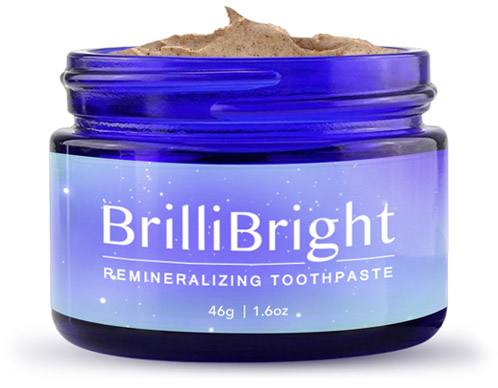Rosehip is the vitamin C champion. How much vitamin C is in rosehip? Just think about it, 100 grams of dried fruits contain 18 daily doses of vitamin C! This is 50 times more than in a lemon and 10 times more than n black currants. It's truly impressive.
Did you know
that every human mouth harbors over 700 species of bacteria? It is true, and the population is only higher in our gut! There is a symbiotic relationship among the microorganisms in our oral cavity. If pathogenic bacteria take over, we get infection and disease. Our mouth is where digestion begins, so this microflora is vital in maintaining oral and overall health.
If you like our Oral Balm, you'll love our new, 100% natural BrilliBright Remineralizing Toothpaste. No water, no preservatives. You’ll need just a little dab to alkalinize your mouth and freshen your breath. Your teeth will feel squeaky clean and look brighter, for sure. Give it a try and you'll never want to use a commercial toothpaste again.
Tea Tree Oil
Tea tree oil is strongly antiseptic and effective against a broad range of bacterial and fungal infections. Because it is strongly germicidal, the oil is used in dentistry. Tea Tree leaf oil is a natural cure for foul breath and contains anti-plaque chemicals.
This oil is ideal for mouthwash because it can fight bacteria, prevent tooth decay, and soothe bleeding gums. Tea tree leaf oil is quite effective for periodontal, fungal, and viral diseases. In a study including ten different essential oils, tea tree oil was found to be efficient against a diversity of Gram-positive and Gram-negative bacteria.
Coconut Oil
One of the special ingredients in my new toothpaste! Due to the presence of lauric acid in coconut oil, this toothpaste works wonders against various oral and systemic ailments and bacterial and fungal contaminations.
Lauric acid helps prevent dental cavities and improve oral health because of its anti-bacterial and anti-inflammatory properties. One recent study found that the coconut oil compound Monolaurin is responsible for killing bacteria such as Staphylococcus aureus, Candida spp., Helicobacter pylori, Escherichia vulneris, and Enterobacter spp.
Calcium Carbonate
Calcium carbonate. CaCO3 is the chemical formula. Carbon. Oxygen. Calcium. Calcium carbonate is a gentle abrasive that aids in removing plaque safely and softly polishes away surface stains while brushing. One 2019 study in Japan confirmed that toothpaste containing calcium carbonate has a greater ability to remove plaque than does a toothpaste without.
Kaolin Clay (Kaolinite)
Kaolinite is used in manufacturing dental medications used to treat swelling and ulcers in the mouth and to halt bleeding and swelling inside the mouth induced by radioactivity treatments. Kaolinite has antimicrobial properties—especially relevant in dentistry, as periodontitis is a bacterial infection. Kaolinite’s use as an anti-inflammatory in poultices is of particular importance in oral surgery and periodontology, as it may reduce gum bleeding.
Cinnamon Oil
Cinnamon bark oil shows significant antibacterial activity against various oral pathogens linked with dental cavities, periodontal disorders, and tooth infections.
One recent study showed that a polyphenolic cinnamon fraction might benefit oral health by lowering Candida albicans’ ability to build biofilm and adhere to oral epithelial cells, a pathogenic fungus that causes oral candidiasis. Interestingly, other studies have found that cinnamon components, primarily essential oils extracted from the bark, exhibit anti-bacterial properties against both Gram-positive and Gram-negative oral bacteria.
Clove
Clinical studies have shown that clove oil treats tooth discomfort and bad breath and aids in preventing gum disease. Clove oil also has a natural tendency to inhibit the growth of bacteria, aiding in the treatment of mouth and throat infections. Chemicals which act vigorously against germs linked to plaque formation and gum disease are primary components of clove bud oil, Eugenol, β-caryophyllene and eugenyl acetate. These compounds also show benefits in dental care. They are, effective against a wide range of pathogens, suggesting a promising treatment option for periodontal disease.
Diatomaceous Earth
has traditionally been mined for use as a tooth powder. Its abrasive action is mild on teeth, yet effective at removing plaque and tartar. Additionally, DE promotes strong tooth enamel, which helps prevent tooth decay and gum recession. What’s more, diatomaceous earth has been known for its tremendous potency in whitening teeth, alleviating periodontitis and gum inflammation.
How to Use Your BrilliBright Toothpaste
1.
Use a very small amount.
2.
Brush your teeth for two full minutes—
not a second less!
BrilliBright
Remineralizing
Toothpaste
